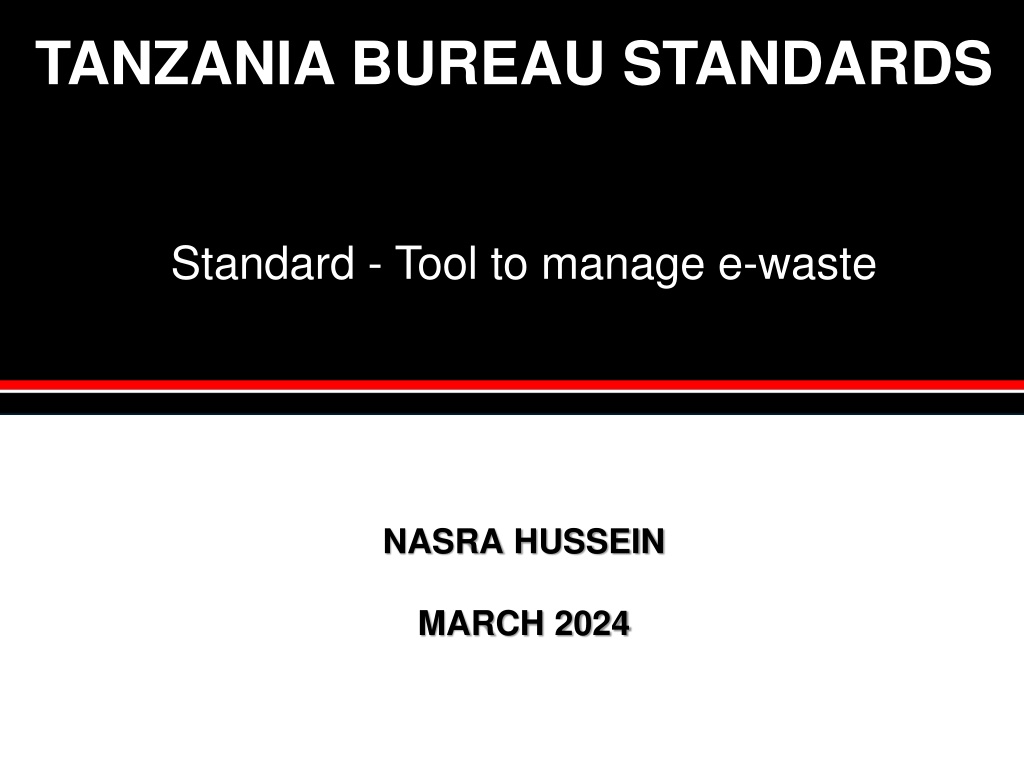
Managing E-Waste: Tanzania Standards Bureau Initiatives
"Explore how Tanzania Bureau of Standards is leading the way in managing e-waste through the development of national standards, ensuring quality, safety, and environmental protection. Learn about the principles of standards development, stakeholder engagement, and the benefits of adhering to these standards."
Download Presentation

Please find below an Image/Link to download the presentation.
The content on the website is provided AS IS for your information and personal use only. It may not be sold, licensed, or shared on other websites without obtaining consent from the author. Download presentation by click this link. If you encounter any issues during the download, it is possible that the publisher has removed the file from their server.
E N D
Presentation Transcript
TANZANIA BUREAU STANDARDS Standard - Tool to manage e-waste NASRA HUSSEIN MARCH 2024 1
Contents Introduction About standardization E-waste standards Conclusion 2
Who Are We ? TBS Tanzania Bureau the of Standards Standards, (TBS), established by the Standards Act No 1 of 1975 as amended by Act No. 2 of 2009, Mandated to formulate standards, implementation, training and provide certification services Published about more than 3000 National Standards to date National national standards 20 March, 2025 3
What is a standard? A standard is a document that provides requirements, specifications, guidelines or characteristics that can be used consistently to ensure that materials, products, processes and services are fit for their purpose. Standard ensures quality and safety to the producer, consumer and environment.
Principles of Standards Development Standards Development process follows the International Best Practice, describe in the world Trade Organization/Technical Barrier to Trade (WTO/TBT) agreements, under Art. 4, Annex 3 (Code Adoption, and application of Standards) it outline 10 principles 7 from WTO/TBT and ISO has added 3 principles: of preparation, 5
Standards Key principles Transparency Openness Impartiality and Consensus Effectiveness and relevance Coherence Development dimension Stakeholder engagement Due process National implementation/adoption All to be adhered in the national Standard 6
BENEFITS OF STANDARDS Trade facilitation Interchangeability Serve as means of communication Safeguards the environment, health and play important role in safety measures Safeguards consumer interests Applied in regulations Variety reduction Technology transfer
Standards formulation The involves experts from different institutions They include but manufacturers, regulators, government institutions, academic institutions TBS serves as secretariat process of standards formulation not limited researchers NGOs to: and
Stages of Standards formulation Stage 1: Working Group (WG)-optional. Stage 2: Technical Committee (TC). Stage3: Divisional Committee (DC). Stage4: Stakeholders Comments. Stage5: Approval by the Board of Directors. Stage6: Gazetting by the Minister. Stage 7: Publication.
Genesis of e-waste standard TBS was a member of EACO e-waste National Steering Committee. One among the activity in the 1stEACO Regional strategy was to develop e-waste standard by the Bureau E- waste standard started to be developed in 2017 through stakeholders participation and finalized in 2018 10
e-waste standard e-waste standard The standard was developed by stakeholders under Solid Waste Technical Committee and it was finalized as TZS 2261:2018 Electrical and electronic waste management: Handling, collection, transportation, refurbishment, dismantling, recycling, storage and disposal 11
E-waste Standard requirement General Requirements This part gives out general requirements where Legal and other requirements, including regulatory and international requirements that are directly applicable to electrical and electronic equipment's that need to be identified and adhered. 12
E-waste Standard requirement Responsibilities This section gives in detail the responsibility of different stages of e- waste dealers Responsibility of manufacturer and or dealer Responsibility of consumer/generator Responsibility of collector Responsibility of refurbisher Responsibility of dismantler Responsibility of recycler Responsibility of disposer 13
E-waste Standard requirement Receiving, handling and storage Electrical and electronic waste shall be handled and stored in a manner that: (a) Prevents theft or vandalism; (b) Prevents exposure of people on site to unsafe storage and handling conditions or hazardous substances; and (c) Not be powered unless it has been tested and tagged to indicate it is safe to power. 14
E-waste Standard requirement Records management All operational records shall be maintained to allow the traceability of electrical and electronic equipment, including chain of custody documents, transport records. 15
Conclusion Standards ensure safety, quality and reliability of products and services; facilitate trade and protect our health and the health of the environment Lets play our part 16
Thank you 17
